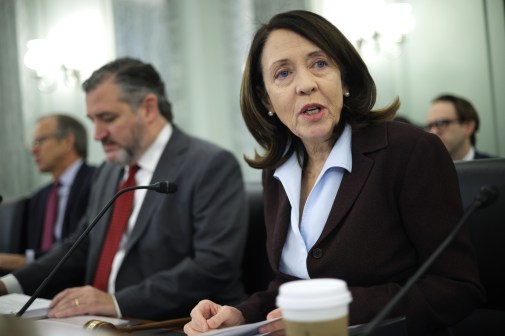How the government is dealing with its own data challenges
How can the government use data to function better? Who should get access to what data sets? Can members of the public find the government data they need?
These were some of the questions discussed Thursday at MarkLogic’s Data Innovation Summit, where federal leaders examined how the government currently works with data and how those processes will mature in the future.
Lynn Overmann, deputy chief data officer for the Commerce Department, highlighted how the government has been collecting and managing data for more than 200 years, since the census was mandated under the Constitution. But due to the rapid proliferation of technology, the private sector’s ability to gather data has caught up with the government’s — and, in some cases, surpassed it.
“For a very, very long time, government had a monopoly on data,” Overmann said at the event, produced by FedScoop. “We were the only ones that had the capacity, the capability and the resources to collect data. Those times have changed.”
But even while the private sector continues to find new ways to use data, Overmann said the government’s longtime work with data positions it to be a partner with companies that are looking for ways to innovate.
“We have tremendous expertise in the collection and curation and protection of data,” she said “The data we release is data people can rely on. Not only do we collect a massive amount of data, we’ve done it in the same way over many, many years.”
Outside of relationships with private industry, other agency leaders are figuring out how data is furthering agency missions.
Federal Communications Commission Chief Information Officer David Bray said during a panel that it’s crucial for people to see how data improves their ability to do their job.
“If anything, it’s more of a conversation with the mission elements so they can understand what’s possible and help them begin to prioritize,” Bray said. “I think it’s really easy to look at the outside world and say, ‘I want Amazon or Google, make that happen in my organization,’ but people aren’t thinking about how it fits into the context of their work.”
Overmann gave examples how data is helping agencies do that work, highlighting how the Centers for Medicare and Medicaid Services is using predictive analytics to track Medicare fraud, news outlets are tapping census data to examine the recent unrest in Baltimore, and the National Oceanic and Atmospheric Administration recently decided to store its weather data on a number of cloud service providers’ services.
“We are a key actor in the most important and critical conversations going on in the country, and we will continue to be so,” she said.
But even with current partnerships, agency leaders understand that data is only continuing to grow. With that growth comes the need for new ways for public and private companies to work together.
Stephanie von Friedeburg, the World Bank Group’s CIO, said she would like private companies to share more of their data, which would allow the institution to further fulfill its mission of eradicating poverty.
“If you think about who is collecting interesting data in emerging markets, it’s mobile operators, it’s electricity companies, it’s retail organizations,” von Friedeburg said. “It gives us a sense of the maturity of the economy where we need to be thinking about different engagements to help those economies.”
Overmann said whatever agencies decide to do, they should not be afraid to try new things.
“It’s a massive experiment and we are walking into it eyes wide open, This may be too hard, and we may not be technically capable of doing this yet, policy issues might be too hard, it might not work. It could be a massive failure and that’s OK,” she said.
Agencies have heaps of data at their fingertips, she added. “We just have to figure out how to work through these really challenging questions.”




